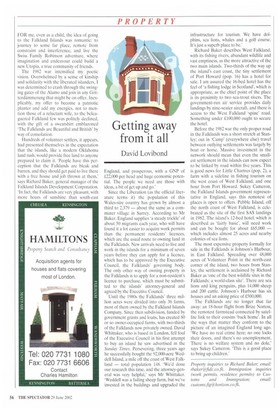Getting away from it all
David Lovibond
FOR me, even as a child, the idea of going to the Falkland Islands was romantic: to journey to some far place, remote from constraint and interference, and live the Swiss Family Robinson adventure, where imagination and endeavour could build a new Utopia, a true community of friends.
The 1982 war intensified my poetic vision. Overwhelmed by a sense of kinship and solidarity with the liberated islanders. I was determined to crash through the swinging gates of the Alamo and join in any Gotterdammerung that might be on offer, Inexplicably, my offer to become a patriotic planter and add my energies, not to mention those of a reluctant wife, to the beleaguered Falkland few was politely declined, with the gift of a sweatshirt emblazoned 'The Falklands are Beautiful and British' by way of consolation.
Hundreds of volunteer settlers, it appears, had presented themselves in the expectation that the islands, like a modern Oklahoma land rush, would provide free land to anyone prepared to claim it. 'People have this perception that the Falklands are bleak and barren, and they should get paid to live there with a free house and job thrown at them,' says Richard Baker, general manager of the Falkland Islands Development Corporation, 'In fact, the Falklands are very pleasant, with more hours of sunshine than south-east
England, and prosperous, with a GNP of £22,000 per head and huge economic potential. The people we need are those with ideas, a bit of get up and go.'
Since the Liberation (as the official literature terms it) the population of this Wales-size country has grown by almost a third to 2,379 — about the same as a commuter village in Surrey. According to Mr Baker, England supplies 'a steady trickle' of about 50 migrants each year, who will have found it a lot easier to acquire work permits than the permanent residents' licences, which are the usual route to owning land in the Falklands. New arrivals need to live and work in the islands for a minimum of seven years before they can apply for a licence, which has to be approved by the Executive Council, the Falklands' governing body. The only other way of owning property in the Falklands is to apply for a non-resident's licence to purchase, which must be submitted to the islands' attorney-general and agreed by the Executive Council.
Until the 1980s the Falklands' three million acres were divided into only 36 farms, most of them owned by the Falkland Islands Company. Since then subdivision, funded by government grants and loans, has created 80 or so owner-occupied farms, with two-thirds of the Falklands now privately owned. David Whittaker, who is based in London, fell foul of the Executive Council in his first attempt to buy an island he saw advertised in the Sunday Times. Persevering, three years ago he successfully bought the 92,000-acre Weddell Island, a mile off the coast of West Falkland — total population 148. 'We'd done our research this time, and the attorney-general was very helpful,' says Mr Whittaker. 'Weddell was a failing sheep farm, but we've invested in the buildings and upgraded the infrastructure for tourism. We have dolphins, sea lions, whales and a golf course. It's just a superb place to be.'
Richard Baker describes West Falkland, with its fishing rivers, abundant wildlife and vast emptiness, as the more attractive of the two main islands. Two-thirds of the way up the island's east coast, the tiny settlement of Port Howard (pop. 16) has a hotel for sale. I am assured the 16-bed hotel has the feel of 'a fishing lodge in Scotland', which is appropriate, as the chief point of the place is its proximity to two sea-trout rivers. The government-run air service provides daily landings by nine-seater aircraft, and there is access to the West Falkland 'spine' road. Something under £100,000 ought to secure the hotel.
Before the 1982 war the only proper road in the Falklands was a short stretch at Stanley; out in 'Camp' (everywhere else) travel between outlying settlements was largely by boat or horse. Massive investment in the network should mean that even the smallest settlement in the islands can now expect to be linked by road within five years. This is good news for Little Chartres (pop. 2), a farm with a sideline in fishing tourism on the west coast of West Falkland, and one hour from Port Howard. Sukey Cameron, the Falkland Islands government representative in England, says this remotest of places is open to offers. Pebble Island, off the north coast of West Falkland, is celebrated as the site of the first SAS landings in 1982. The island's 12-bed hotel, which is described as 'fairly basic', will need work and can be bought for about £65.000 — which includes almost 25 acres and nearby colonies of sea lions.
The most expensive property formally for sale in the Falklands is Johnson's Harbour, in East Falkland. Spreading over 48,000 acres of Volunteer Point in the north-east corner of the island, two hours from Stanley, the settlement is acclaimed by Richard Baker as 'one of the best wildlife sites in the Falklands; a world-class site'. There are sea lions and king penguins, plus 14,000 sheep and 200 cattle. Johnson's Harbour has six houses and an asking price of £500,000.
The Falklands are no longer that far away: an 18-hour flight from Brize Norton, the remotest farmstead connected by satellite link to their cousins 'back home'. In all the ways that matter they conform to the picture of an imagined England long ago. 'We have no real crime here; no one locks their doors, and there's no unemployment. There is no welfare system and no dole,' says Sukey Cameron. 'This is a good place to bring up children.'
Property inquiries to Richard Baker; email: rbaker@fidc.co.fk. Immigration inquiries (work permits, residence permits) to Cus toms and Immigration; email: customs.fig@horizon.co.fk.


































































 Previous page
Previous page